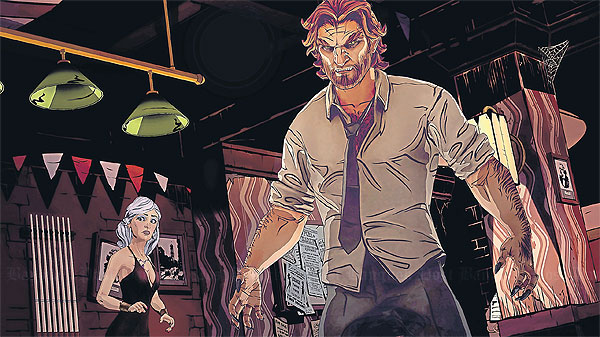
Telltale Games’ The Wolf Among Us series is based on the comic book Fables by Bill Willingham.
GAME NOTES:
"The Wolf Among Us," developed for the PlayStation 3, Xbox 360, PC and Mac, is rated M (Mature, for players 17 and older). It has swearing, violence and a fairy-tale prostitute.
Video-game players are the original binge viewers. Long before Netflix's "House of Cards" and "Orange Is the New Black" dispensed with the notion that television needed to be rationed and served in single helpings once a week, video games allowed their gluttonous players to feast at an array of all-you-can-eat buffets.
A big-budget video game is typically as long or longer than an entire season of a television show, and sometimes you're looking at the equivalent of a full series arc. Watching all of "Breaking Bad" takes more than 50 hours, and at least at that point you know you've seen every frame. Play, say, "Grand Theft Auto V" for a full workweek plus overtime, on the other hand, and there will still be people and places that you have yet to witness.
Amid this Golden Corral of cultural consumption, Telltale Games is making a bid to become the studio of choice for players with low self-control. Telltale's games are released at an almost frenetic pace. Pitched as "episodes," the games are produced in roughly two-hour chunks and issued more or less monthly as part of a TV-style season. The five episodes of the first season of "The Walking Dead," one of the better video games of 2012 and by far the most commercially successful game from Telltale, were released in $5 increments last year from April to November.
"The Wolf Among Us," Telltale's newest series - "Faith," the first episode, was released Friday for PC and Xbox 360, with PlayStation 3 and Mac versions promised this week - adheres closely to the "Walking Dead" formula. Once again, Telltale has found a popular comic book ("Fables," in this case, by Bill Willingham) with a rich universe that it can use to tell new stories.
In "The Wolf Among Us," as in "Fables," fairy-tale characters - from the lands of the Brothers Grimm and Lewis Carroll and L. Frank Baum and everywhere in between - live in exile and in secret in New York City after being cast out from their homelands. Snow White helps run the government. Mr. Toad oversees a tenement in the South Bronx. Ichabod Crane is the deputy mayor. That sort of thing.
In this Hogwarts meets "True Blood" universe, the community's sheriff is the Big Bad Wolf, who now goes by Bigby and takes the guise of a human. He's a lycanthropic Mike Hammer, quick not only to violence but also to crack the case. As Bigby, players investigate the death of a fairy-tale call girl. Did she die at the hands of the Big Bad Wolf's old nemesis, the Woodsman (who, it turns out, wasn't showing up at Red Riding Hood's grandmother's house intending to rescue her)? Or someone else?
This is a morsel, not a meal, with four more episodes on the way, so the mystery remains unsolved, and new mysteries emerge. The game is marred by some of the loading glitches and other technical troubles that afflicted "The Walking Dead" - the video game version of leaving a boom microphone in the frame - but as with that game, the mostly strong writing, acting and art direction work together to overcome those flaws. Based only on this amuse-bouche, "The Wolf Among Us" looks to be a pleasant repast, even if it is unlikely to be as delicious as "The Walking Dead," whose second video-game season is forthcoming.
The most disappointing aspect of "The Wolf Among Us" were the obtrusive "story notifications," bits of on-screen text that inform you of the consequences of Bigby's actions. "He's going to remember that," the game tells you after you confront the Woodsman in the opening scene.
Almost without exception, these notifications are depressingly redundant. Say nothing, and the game might tell you, "You chose not to respond." Be evasive in response to an inquiry from the Little Pig in your apartment and you'll be told, "You avoided his question." Make a character cower in fear and the game, apparently fearful that dialogue and animation are insufficient to get the point across, interjects that he is "afraid of the Big Bad Wolf."
"In The Walking Dead," Telltale gave players the option to turn these ruinous notifications off, and the result was a seamless work of interactive fiction that kept you guessing as to when your decisions mattered and when they didn't. Then, at the end of each episode, you could see what the major choices were, and what percentage of players let a particular character die, or decided not to help another. (It turns out that video game players are a bunch of do-gooders.)
In the Xbox 360 version of "The Wolf Among Us" that I played, there was no option to turn these announcements off, though the end-of-game statistics remain. Imagine a pop-up window announcing that "Carrie will remember that" just after Saul betrays her on "Homeland," and you get the sense of how condescending these notifications are. It's a step backward for Telltale, who showed last year that interactive stories could be better than the ones on television. Video-game players will remember that.
New York Times News Service
Vocabulary
- skirmish (n): a short fight between groups of people or soldiers
contemplative (adj): thinking quietly and seriously about something
epidemic (n): a large number of cases of a particular disease happening at the same time in a particular community
scads (n): large numbers or amounts of something
horde (n): a large crowd of people
escort (v): to go with somebody to protect or guard them or to show them the way
gnome (n): a plastic or stone figure of a small creature like a man, used as a garden ornament
How do you like this game review? If you have any suggestions, please don't hesitate to share them on http://www.facebook.com/studentweekly.
You can also read previous articles here.


